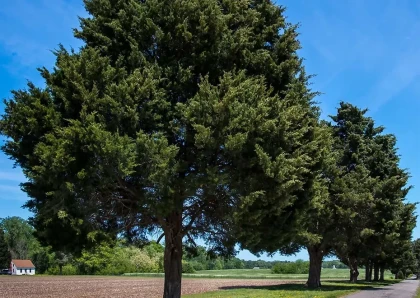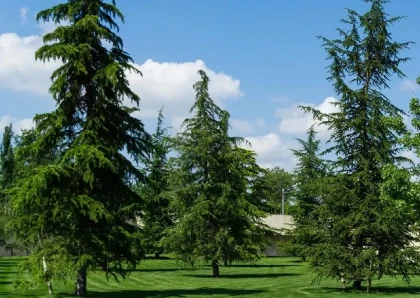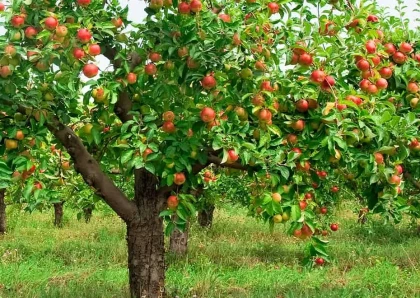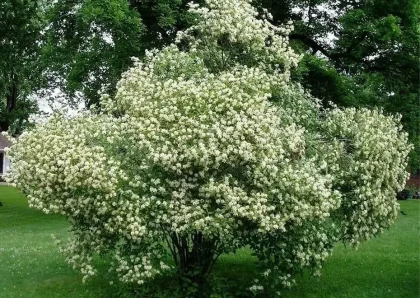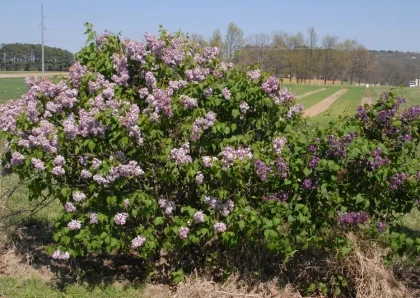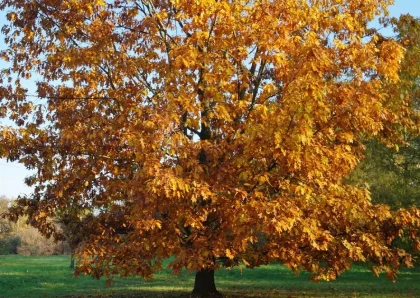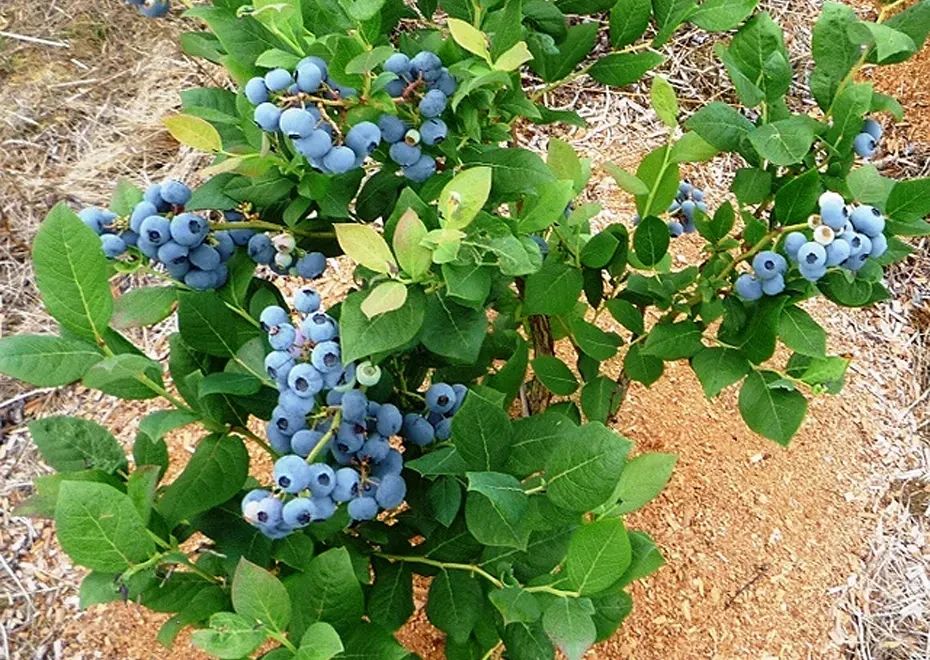
Bluecrop Blueberry
Overview
Description
Bluecrop is a popular cultivar of highbush blueberries (Vaccinium corymbosum), which are a type of North American blueberry. Highbush blueberries are commonly grown for commercial production and home gardening due to their large fruit size, delicious flavor, and relatively easy cultivation.
Characteristics:
- Fruit: The Bluecrop blueberries are medium to large in size, typically around 1/2 inch to 3/4 inch in diameter. They have a light blue color, a firm texture, and a sweet, mildly tangy flavor.
- Ripening time: Bluecrop blueberries are known for their mid-season ripening, which makes them available for harvest during the middle to late summer months, depending on the climate and location.
- Yield: This cultivar is prized for its high yield potential, meaning it can produce a significant amount of fruit per plant, making it economically attractive for commercial growers.
- Vigorous growth: Bluecrop blueberry bushes are relatively vigorous, establishing themselves well and producing abundant new growth each year under suitable growing conditions.
- Disease resistance: While no plant is entirely immune to diseases, Bluecrop blueberries exhibit good resistance to certain common blueberry diseases, making them more resilient and easier to manage in the garden.
- Cold hardiness: Highbush blueberries, in general, are adapted to cold climates, and Bluecrop is no exception. It can tolerate colder temperatures, which is essential for regions with harsh winters.
Uses of Bluecrop Blueberries
- Fresh Consumption: The most common use of Bluecrop blueberries is for fresh consumption. These berries are enjoyed for their sweet, mildly tangy flavor and are perfect for snacking or adding to various dishes.
- Culinary Applications: Bluecrop blueberries are used in cooking and baking to enhance the flavor and appearance of dishes. They are used in sauces, jams, preserves, and syrups, and are an excellent addition to desserts.
- Smoothies and Juices: These blueberries are a popular ingredient in smoothies and juices due to their natural sweetness and nutritional value. They can be blended with other fruits and vegetables for delicious and nutritious beverages.
- Freezing and Preserving: Bluecrop blueberries can be frozen to extend their shelf life while retaining their taste and nutrients. They are also used for making preserves and canned products to enjoy throughout the year.
- Nutritional Benefits: Bluecrop blueberries are rich in antioxidants, vitamins, and dietary fiber, making them a healthy fruit choice with potential health benefits.
- Landscaping and Ornamental Use: Blueberry bushes, including Bluecrop, can be used in landscaping to add beauty to gardens. They produce lovely white flowers in spring and have colorful foliage in the fall.
- Commercial Farming: Bluecrop blueberries are a popular choice for commercial blueberry farming due to their high yield potential and economic viability for growers.
- Wildlife Attraction: Blueberry bushes attract various wildlife, including birds and small mammals, providing them with a food source and making them valuable additions to wildlife-friendly gardens.
Benefits of Bluecrop Blueberries
- Rich in Antioxidants: Bluecrop blueberries are a potent source of antioxidants, particularly anthocyanins, which help neutralize harmful free radicals in the body and protect cells from damage.
- Heart Health: Regular consumption of Bluecrop blueberries may contribute to improved heart health by helping to lower blood pressure, reduce LDL cholesterol levels, and promote healthy blood vessels.
- Brain Function: The antioxidants and phytochemicals in Bluecrop blueberries have been associated with enhanced cognitive function, memory, and reduced risk of age-related cognitive decline.
- Anti-Inflammatory Properties: Bluecrop blueberries contain compounds with anti-inflammatory properties that may help reduce chronic inflammation and lower the risk of certain diseases.
- Digestive Health: Being a good source of dietary fiber, Bluecrop blueberries support healthy digestion and regular bowel movements, promoting gut health.
- Weight Management: Bluecrop blueberries are relatively low in calories and high in fiber, which can help with weight management by promoting feelings of fullness and satiety.
- Eye Health: Blueberries, including Bluecrop, contain antioxidants such as lutein and zeaxanthin, which may help protect the eyes from age-related macular degeneration and cataracts.
- Immune Support: Bluecrop blueberries are a source of vitamin C, which is known for its immune-boosting properties, helping to support the body's defense against infections.
- Skin Health: The antioxidants and vitamin C in Bluecrop blueberries contribute to healthy and glowing skin by protecting against oxidative stress and promoting collagen production.
- Hydration: Bluecrop blueberries have a high water content, contributing to overall hydration and supporting proper bodily functions.
Tips for Planting and Maintaining Bluecrop Blueberries
Planting Tips:
- Choose the Right Location: Select a planting site with full sun exposure and well-draining soil.
- Soil pH: Blueberries prefer acidic soil with a pH between 4.5 and 5.5. Consider testing your soil and amending it if necessary.
- Spacing: Plant Bluecrop blueberries about 4 to 6 feet apart to allow sufficient room for growth.
- Planting Depth: Set the root ball of the plant level with the ground and cover it with soil.
- Watering: Provide adequate water during the first growing season to establish the plants.
Maintenance Tips:
- Pruning: Prune Bluecrop blueberry bushes in late winter or early spring to remove dead or diseased branches and encourage new growth.
- Fertilization: Use a balanced fertilizer specifically formulated for blueberries to promote healthy growth and fruit production.
- Mulching: Apply a layer of organic mulch around the base of the plants to conserve moisture, suppress weeds, and maintain soil acidity.
- Watering: Blueberry plants require consistent moisture, especially during fruit development. Keep the soil evenly moist, but avoid waterlogged conditions.
- Pest and Disease Control: Monitor for pests and diseases regularly and take appropriate measures to control them, such as using insecticidal soap or organic treatments.
Cons of Planting Bluecrop Blueberries
- Soil pH Requirement: Blueberries, including Bluecrop, prefer acidic soil with a pH between 4.5 and 5.5. Maintaining the right soil pH can be challenging, especially in regions with naturally alkaline or neutral soil.
- Acidic Soil Maintenance: Consistently maintaining the required acidic soil pH may require regular soil testing and amendments to create the optimal conditions for growth.
- Climate Suitability: Bluecrop blueberries thrive in specific climates, particularly regions with cold winters and moderate summers. They may face challenges in warmer or tropical climates.
- Cross-Pollination Requirement: Bluecrop blueberries benefit from cross-pollination for better fruit yields, necessitating planting near another compatible blueberry cultivar.
- Bird Attraction: Blueberries are attractive to birds, and if not protected, birds can significantly reduce the harvest as the fruits ripen.
- Pruning and Maintenance: Regular pruning and proper maintenance are required for healthy plant development and optimal fruit production.
- Frost Sensitivity: Bluecrop blueberries can be sensitive to spring frost damage if exposed to late-season frosts. Frost protection measures might be necessary in colder climates.
- Establishment Time: Blueberry bushes, including Bluecrop, may take a few years to become fully established and reach their maximum fruit-bearing potential.
- Disease and Pest Vulnerability: Like any plant, blueberries can be susceptible to certain diseases and pests, requiring regular monitoring and appropriate pest management practices.
Conclusion
Bluecrop blueberries (Vaccinium corymbosum 'Bluecrop') are a widely popular and versatile blueberry cultivar known for their exceptional fruit quality, high yield potential, and adaptability to various growing conditions. Developed in New Jersey, United States, Bluecrop blueberries have become one of the most extensively planted and commercially successful blueberry varieties worldwide.
These blueberries are loved for their sweet, mildly tangy flavor and juicy texture, making them ideal for fresh consumption, culinary applications, and various desserts. They are also rich in antioxidants, vitamins, and dietary fiber, offering numerous health benefits, including heart and brain health support.
Bluecrop blueberries thrive in full sun and well-draining acidic soil with a pH between 4.5 and 5.5. They require proper planting and maintenance, including pruning, watering, and fertilization, to ensure healthy growth and optimal fruit production. While they can take a few years to become fully established, their high fruit yield and adaptability make them rewarding choices for growers.
Whether enjoyed in smoothies, baked goods, or simply fresh, Bluecrop blueberries continue to delight people with their delightful taste and nutritional value. Whether in home gardens or commercial farms, Bluecrop blueberries remain a beloved and sought-after variety, contributing to their continued popularity worldwide.
Bluecrop blueberries' popularity is not only due to their delicious taste and nutritional benefits but also because they are well-suited for both home gardeners and commercial farmers. Their ability to thrive in diverse climates and produce abundant, medium-sized berries has made them a favorite among blueberry enthusiasts.
Frequently Asked Questions (FAQs)
1. What are Bluecrop blueberries?
Bluecrop blueberries are a variety of Vaccinium corymbosum, a species of blueberry, known for their excellent fruit quality, high yield potential, and versatility.
2. How do Bluecrop blueberries taste?
Bluecrop blueberries have a sweet and mildly tangy flavor with a pleasant juiciness, making them delicious for fresh consumption and culinary applications.
3. Where are Bluecrop blueberries grown?
Bluecrop blueberries are grown in various regions worldwide, with significant cultivation in North America, Europe, and other suitable climates.
4. When do Bluecrop blueberries ripen?
The ripening time for Bluecrop blueberries depends on the location and climate, but generally, they ripen from mid to late summer.
5. Do Bluecrop blueberries require cross-pollination?
While Bluecrop blueberries are partially self-pollinating, they generally benefit from cross-pollination with other compatible blueberry varieties to increase fruit yields.
6. What are the health benefits of consuming Bluecrop blueberries?
Bluecrop blueberries are rich in antioxidants, vitamins, and dietary fiber, offering potential health benefits, including support for heart health, brain function, and immune system.
7. How do I care for Bluecrop blueberry plants?
Proper care for Bluecrop blueberry plants includes providing well-draining acidic soil, regular watering, pruning, and appropriate fertilization to ensure healthy growth and fruit production.
8. Can I grow Bluecrop blueberries in containers?
Yes, Bluecrop blueberries can be grown in containers, making them suitable for small gardens, patios, or balconies, as long as the right growing conditions are provided.
9. How long does it take for Bluecrop blueberry bushes to start producing fruit?
Bluecrop blueberry bushes typically take a few years to become fully established and start producing significant fruit yields.
10. Are Bluecrop blueberries good for baking and cooking?
Yes, Bluecrop blueberries are excellent for baking, cooking, and making various desserts, sauces, and preserves due to their sweet and flavorful taste.





